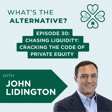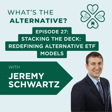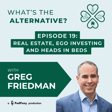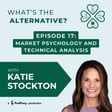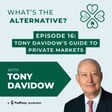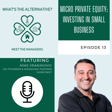Become a Creator today!Start creating today - Share your story with the world!
Start for free
00:00:00
00:00:01

What’s the Alternative? | Episode 24 | Roundabouts and Real Estate: A Multifamily Adventure with Ivan Barratt
Get ready for a deep dive into the world of multifamily real estate investing! In this episode of 'What's the Alternative?', host Shana Orczyk Sissel sits down with Ivan Barrett, founder and CEO of The BAM Companies, to explore the ins and outs of multifamily investing. Ivan shares insights from over 25 years in real estate, discussing the impact of fiscal policies, the current market outlook, and why the Midwest offers unique investment opportunities.
Discover how The BAM Companies approaches property management, the importance of school districts, and BAM's dedication to community impact and economic resilience.
Key takeaways:
- The stability and potential of multifamily investments amid economic fluctuations.
- How The BAM Companies identifies undervalued assets and manages them for optimal returns.
- The role of school districts in property investment strategies.
- BAM's focus on community impact and fostering a positive workplace culture.
Connect with us!
Transcript
Introduction to Real Estate Discussion
00:00:00
Speaker
There's a lot of things that can be disrupted, Shayna, but people still need a roof over their head. And the ability to be anti-fragile and robust in a downturn, because you and I know winter is coming eventually, seemed like the best specialization to focus on.
00:00:28
Speaker
Hello, everyone, and welcome to another episode of What's the Alternative, where we sit down with the practitioners in the space and we get into the nitty-gritty about individual alternative strategies. I know we've been talking a lot of real estate recently.
00:00:44
Speaker
ah it is the number one area that Our advisors are finding their clients are interested.
Guest Introduction: Ivan Barrett
00:00:51
Speaker
It's obviously a hot topic as we talk about the impacts of interest rates, as we talk about Fed policy, ah which I do on a regular basis on TV.
00:01:01
Speaker
ah So it is... incredibly timely to have Ivan Barrett with us from ah BAM Capital. ah He is the founder and CEO of the BAM Companies, of which our partner BAM Capital is the private equity arm.
00:01:16
Speaker
He is a multifamily owner, fund manager, and syndicator who specializes in large apartment communities within the Midwest. Since 2015, Ivan has raised nearly $500 billion dollars in equity and acquired over 9,000 units and had over $1.73 billion in transaction volume.
00:01:36
Speaker
ah His company, the BAM Companies, has grown to be best in class, seven-time Inc. 5000 private equity and management firm, and has won numerous cultural awards. He focuses his time on equity finance acquisitions and company strategy and um is very involved in his community as an active member of the Young Presidents Organization and the National Monthly Housing Community and a former board member of the Indiana Apartment Association.
00:02:01
Speaker
ah He enjoys public speaking, which makes him perfect for a podcast. And he has been on lots of podcasts besides this one. So ah he should be a really good guest and everybody should enjoy his ah commentary here.
00:02:15
Speaker
ah So without further ado, I'd like to introduce Ivan Barrett from BAM to
Multifamily Real Estate Market: Challenges and Opportunities
00:02:20
Speaker
the show. How are you? I'm great. It's good to be here, Shayna. I've been looking forward to this one and thank you for the ah the wonderful introduction. i will do my best to deliver some value for your audience.
00:02:31
Speaker
Well, that is amazing. Given your extensive experience in multifamily and real estate in general, um there's been a lot of discussion lately about cost of housing and opportunities in residential real estate. We've had some folks on here talking about single family home rentals and the opportunities there in the Midwest. But I'd love to get your viewpoint on the overall outlook for the market and the impact of some fiscal and monetary policy um on the space that you focus on multifamily?
00:03:03
Speaker
Absolutely. So a little bit of a setup. I've been in real estate now 25 years since graduating B school with real estate and finance specialization. so I'm coming through what I would call the the fourth correction of my career, ah dot com, GFC,
00:03:21
Speaker
We had a a short but sharp one in the very beginning of COVID lockdown, did some of my best deals then. And now the fourth one um due in no small part to inflation and the fastest ah change in the the interest rates.
00:03:38
Speaker
in Fed history um and their last increasing of the ah of the Fed funds rate faster than they've ever done. And so that has ah definitely created a ah ah correction in the market.
00:03:52
Speaker
Short answer, it's been a ah pretty terrible time to sell, especially in twenty to twenty three, twenty four. And it's still today, it's we're seeing some transaction volume start to ah to come back in the market. But on the other side of the coin, it's been a fantastic time to pick up opportunities.
00:04:11
Speaker
So explain what you mean in terms of picking up opportunities, because it seems that there's not a lot of folks putting things on the market, whether that be multifamily or otherwise, because the interest rates that they have and their borrowing costs were so low that it doesn't make sense ah to have to go out and find other opportunities at a higher cost. But is that different in multifamily as an investor?
00:04:36
Speaker
are Are you seeing something different out there in your landscape? I think you're absolutely correct for the most part across real estate, ah private investments, private placements, private equity, a range of potential acquisitions, whether you're buying a business or a yeah a piece of real estate.
00:04:56
Speaker
The transaction volume has fallen off a cliff. um Anyone who doesn't have to sell right now is not selling us. Case in point, you know, our our hold periods are are increasing ah because it's just not an opportune time to harvest assets where we've delivered value.
00:05:15
Speaker
um There are still opportunities in the market and there are these gems that come along where people, developers or owners have to sell ah in this period for a myriad of reasons.
00:05:29
Speaker
They need a W, they need liquidity, ah they're being forced to sell by ah by an LP who has that right to trigger that sale. And because we're in a position to still ah fill out the capital stack with debt and equity, we're here in the Midwest. We're one of the first calls that get made ah for deal flow. And so while there aren't as many um opportunities to underwrite, there are some opportunities coming our way that are basically buying a business for a better price. So
00:06:02
Speaker
We buy apartments like you and I were talking about before the ah the start of the show. We're typically buying investment grade institutional
Housing Costs and Demand Trends
00:06:10
Speaker
assets. These are 50, 60, $70 million dollars deals, a few hundred apartments, less than 10 years old, um but it is still a private equity play. So we've got to find some mismanagement, some under management, some sort of distress at the asset level ah to get those private equity returns that we ah that we shoot for.
00:06:32
Speaker
And again, there aren't that many of them out there right now, ah but there also aren't that many bidders in the marketplace. ah It's me and a few other operators my size and then mostly the big guys, the Blackstones, the KKRs, the Brookfields that are making the market.
00:06:49
Speaker
Okay. So, you know, we talked about this before we went live on the recording. At the time that we're recording this, we just received CPI and PPI data.
00:07:00
Speaker
One of the interesting things that we're noticing is even though those rates are starting to come down and they're definitely trending in the right direction towards where the Fed's target is, um the one area um of the underlying that is remaining really sticky is housing costs.
00:07:16
Speaker
Um, multifamily housing in particular, um there's a shortage in just residential real estate in general. So there's a lot of pricing power, um, for rents and such. So talk a little bit about how that environment impacts what you're doing and then just general trends in affordability and, uh, things of that nature that impact a lot of our listeners and their families.
00:07:41
Speaker
Um, they want to invest in these things, but, We do find that individual investors like to invest in a way where they feel like they're having a positive impact on their community. So talk a little bit about what you do when you take these properties, when you purchase them, um and how ah the cost of housing and and shortage of housing impacts the pricing opportunity and the pricing power that you have.
00:08:04
Speaker
Yeah, so I'll start with sort of the the the macro picture. The entire US, there are certainly lots of signs of a housing shortage. And then with interest rates where they're at, ah virtually doubling or more the cost of home ownership.
00:08:20
Speaker
you've seen this this big divergence or or spread between what it costs someone to rent a home ah versus to own it. So that's driving a lot of demand.
00:08:30
Speaker
Record absorption this first quarter nationally. ah It's the greatest absorption on on record ah for a Q1. You know, January, February, March, people typically aren't moving.
00:08:43
Speaker
And we absorbed tens of thousands of units higher than we have. I think um it might be on record or or going back to the 80s. Oh, ah as a ah As a percentage of the units coming online. So the absorb means somebody signed a lease and and moved in. Mm-hmm.
00:09:01
Speaker
But local markets, especially the ones that investors piled into and maybe were a little irrationally exuberant in doing so, the South Florida's, Phoenix, Austin, Texas, California.
00:09:17
Speaker
Vegas is another great example. and Even Nashville, Tennessee is experiencing this. ah They're they are overbuilt. And so you've seen negative rent growth pulling down those national numbers.
00:09:28
Speaker
And then in other parts of the country, ah the Midwest, especially in the Northeast, really rose ah They didn't boom like those other markets, but they haven't busted either because the supply and demand fundamentals have have stayed much more in line with ah with a healthy market perspective.
Investment Strategies in the Midwest
00:09:48
Speaker
We typically are targeting a class A property. um As I said, it's been built in 2015, 2020. It's got a nice pool, clubhouse, pickleball, yoga studio. It's got all the things that white collar, ah high income renters are looking for. Mm-hmm.
00:10:08
Speaker
and we target those suburbs where they've got the best schools in a diverse employment picture. And the fundamentals we look for, and then we want to see population and rent growth consistent over a long period of time.
00:10:22
Speaker
And then you put that together with an asset. I'll give you a case study. Out-of-state owner, they own one asset here in ah in a high-quality suburb of Indianapolis.
00:10:33
Speaker
They're managing it through a telescope. They've got ah what we call a third party manager in place. Lots of apartment firms out there, especially the big ones, are usually hiring an outside firm to manage the asset level, the the project level.
00:10:49
Speaker
And we know which ones of those managers are what we would call mediocre or worse. And so we are looking at that as ah as a business where we can come in with our management team,
00:11:01
Speaker
and execute our strategy, enhance rents, ah better operations, and drive those dollars really down to the bottom line, which enhances the value of the asset.
00:11:13
Speaker
And so Like a private equity ah shop with its internal management team, we're looking to buy a business, fix that business, and then and then sell that business.
00:11:23
Speaker
If we do it in three years, we we look like we're a genius. Typically, we're going to be holding them about five years, and sometimes it takes a little bit longer because it it is a cyclical business.
00:11:34
Speaker
Point right now, it's it's not an opportune time to sell. Okay. So it's really interesting. The first thing I was thinking about when you're talking about suburbs of the Midwest is thinking about where you're located in Carmel.
00:11:46
Speaker
And I like to joke with your team that Carmel is the roundabout capital of the world. Yes, it is Mayors fly in from all over to see what Mayor Brainerd did here across his his six terms as as mayor of of our ah great town.
00:12:01
Speaker
You guys have a lot of um residential multifamily properties there. I was down there recently. my son had a karate tournament in the Indiana, AAU Indiana State Championship. And it happened to be in Caramel at one of the um elementary schools.
00:12:17
Speaker
And I think between my hotel and the school, which was only like three miles away, i think i did like 10 roundabouts. and Easy. That's easy. Every intersection. yeah Every intersection. No lights, just roundabouts. Super strange to me. I grew up in Massachusetts. We have rotaries, which are like roundabouts on steroids.
00:12:34
Speaker
um and Not nearly the same thing. And definitely more of a like um hunger game situation on a rotary versus roundabout. um But I find that interesting um because Carmel is a perfect example of ah up and coming, well not no longer up and coming, but certainly a well-developed community, you know,
00:12:51
Speaker
ah a bedroom community to Indianapolis, which is a growing area. But, you know, the Midwest is interesting in that respect in that Most of, um if you look at population trends, a lot of people have been leaving the Midwest, but there are certain areas in the Midwest that people are going to because the cheap cost of living.
00:13:12
Speaker
um Indianapolis, I know Des Moines is a big one. So how do you differentiate across in this particular area of the country, the opportunity set? Because it's not one that people talk about often.
00:13:23
Speaker
It's usually the coast, as you pointed out, the places where all the population was going, the Austins, the Miamis, the Atlantas, the Phoenixes of the world. So how do you kind of look at the opportunity set here in the Midwest and where are you seeing the most demand and growth um in terms of metro areas?
00:13:43
Speaker
Well, you certainly nailed it um with with Carmel or or down here, we still call it Carmel, but we're hoping Carmel sticks. What's happened in the Midwest, which I got to see firsthand growing up here, is you've got these cities, Carmel being a a full-fledged city now, ah pretty dense as well.
00:14:01
Speaker
um You've got these- Prince the roundabouts. That's right. That's right. You've got these exurb cities ah that came up around Indianapolis, Pittsburgh, Kansas City. Des Moines is a great example.
00:14:14
Speaker
You've got these world-class suburbs now. ah that are continuing to attract, for instance, Hamilton County, where Carmel is located, is ah has exploded over the last two decades in population growth, both from in-state and out-of-state migration.
00:14:31
Speaker
And you've got this similar setup in in now Pittsburgh, you know once thought of as ah as an old steel town. a diverse set of suburbs with finance, insurance, technology, education, same thing for Des Moines and Kansas City and and certainly our our great state here of Indiana.
00:14:48
Speaker
And you're seeing a lot of attraction for the cost of living, for the job opportunities, first employment, especially here in Indianapolis. You've got Eli Lilly, big pharmaceutical company, I think on everybody's radar these days.
00:15:03
Speaker
Rolls-Royce, Roche is another big pharmaceutical company. um and billions and billions of dollars in investment in new tech manufacturing, especially automotives making a big comeback.
00:15:16
Speaker
Eli Lilly will go on again, is ah investing 15 billion just northwest of Indianapolis ah in their pharmaceutical manufacturing facility, creating thousands of jobs, not to mention the ancillary economic impact that comes from that sort of economic development.
00:15:36
Speaker
And so you've got these cities that are are still quite undervalued, Shana, from ah from a U.S. perspective, right? They're not the sexy coast or the or the southeast, but they've got population growth.
00:15:49
Speaker
They've got ah lots of tailwinds. and they've got undervalued real estate compared to say ah the Southeast where I'm the same product, um I'm paying a lot more for it and there's a lot more bidders.
00:16:05
Speaker
And as you know all too well, if you've got a lot of capital coming in and a lot of bids, you're you're going to drive or returns down. So we try to look where the puck is going, find those undervalued assets that we have a high conviction in being able to ah to enhance value by bringing our management team to to make those improvements and and fix those those management inefficiencies by some of the third party groups that are out there that aren't doing a bad job. And if their client, a pension or an endowment is only looking to clip an eight or 9% return, they're they're doing just fine.
00:16:41
Speaker
But there's opportunities to to acquire those assets inside our closed ended fund model and target those returns in the in the high teens, low 20s, sometimes better.
00:16:52
Speaker
It's interesting. um Pittsburgh immediately stands out. Now, nothing against the Indianapolis. um ah Britt Mason, who is ah the president of our firm, grew up in the greater Indianapolis area, and she has great things to say about it. But Pittsburgh, just as you were talking about, stood out to me.
00:17:09
Speaker
I was on a phone or a call earlier today with a firm that's in the AI space. And he says Carnegie Mellon is the ai like the premier school for anybody who's interested in exploring career opportunities in AI.
Importance of School Districts in Investment
00:17:23
Speaker
um And so when you said Pittsburgh, I immediately thought about what um was said on that phone call earlier is ai Also, I think Pittsburgh is an incredibly underrated city. I used to cover it when I worked at Fidelity and I traveled a lot.
00:17:37
Speaker
And um if I have to choose between Philly and Pittsburgh of the big cities in PA, I would take Pittsburgh 100% of the time. um and for so many reasons. But to your point, a lot of the cities in the Midwest, whether it be Cincinnati, Buffalo, um the Ohio, Cleveland, um columia Columbus.
00:17:58
Speaker
Yeah. Des Moines, I heard referred to as like the Silicon Valley of the Midwest. um There's a lot of tech there, but also tons of insurance. So to your point, I think a lot of these cities, I'm not sure folks appreciate um how robust they are. And they just think of the fact that the weather is not great, but you know what? I live in Chicago and the weather is not great here and we're world-class city.
00:18:22
Speaker
um So um do us favor. Don't bring this up on, on Fox next time you're on, let's just keep it to, to us and your clients. Okay, i'll I'll do my best. i will do my best. Well, these will be the little hidden gems that people don't realize. But um I'd love to kind of hear, um you you mentioned something that kind of stood out to us. We have ah another client, Scholastic Capital, that does single family home rentals and they focus on school districts. You mentioned school districts.
00:18:50
Speaker
big one yeah Yeah. Can you talk a little bit about um why that's such an important component in your investment strategy of the focus on school districts?
00:19:01
Speaker
Absolutely. ah Schools are a make or break ah decision point for us when underwriting assets. um We want those young families who are looking for a rental product in a great school system ah to be knocking on our door, plain and simple.
00:19:19
Speaker
ah That is a big driver of many households in their decision making on where they're going to live. And so that is a a very early data point that we look pretty hard at before we we progress on ah on a particular acquisition.
00:19:35
Speaker
So with that in mind, um how do you address property of improvement in the Class A ah segment? um ah Considering that those types of families, um the traditional market for um Class A communities has always been basically a two bed, two bath kind of situation.
00:19:56
Speaker
The occasional three bed, two bath, but really the sweet spot is a two bed, two bath. So if you're focused on family, one of the reasons we've seen, you know, growth in the single family rental a market is because families want a home with a yard and enough space for multiple children, mom, dad, couple of kids, a dog.
00:20:17
Speaker
How do those things impact the properties that you look at? And then how do those... um desires by your target market impacts the way that you um do any improvements to the communities or even change particular criteria? the The pet thing is a big one.
00:20:37
Speaker
Yes. So it's all about unit mix today. It really always has been, except we're seeing more shift, right? And you- pointed out very well. it used to be you wanted a mix of ones and twos and and very little three bedrooms.
00:20:52
Speaker
Today, we're seeing a more balanced mix of of ones, twos and three bedrooms. We also like to look for assets that have a number of of townhomes as part of the ah multifamily community. So you've got your own entrance, you're not walking down a hallway. um And in many cases now you've got an attached garage.
00:21:14
Speaker
ah So we have a unit mix where a certain percentage of our residents are going to be families and we wanna be able to have a product that that attracts them to the to the community.
00:21:26
Speaker
um As far as improvements, you know we've evolved quite a bit as a firm. It used to be that we were similar to others in that we would look for older assets where we would make lots of physical improvements versus today.
00:21:39
Speaker
ah We're looking for a much newer asset that really doesn't need much more than maybe some some fixture changes or um some sprucing up if there's been ah deferred maintenance.
00:21:50
Speaker
But we're looking to have those amenities and those floor plans with the nice tall ceilings and the the smart ah systems already in place. And what we target is that that mediocre third-party manager, ah that developer who's got to sell sooner than he would like, or that, again, that big bloated firm that's that's um maybe got one or two assets in the market and they're looking to exit because they they may have to. They've got a defined date where they've got a sell it or they need a win or they need liquidity.
00:22:23
Speaker
So it's less about bringing in those improvements um to the assets we're buying these days than ah than it used to be. ah But certainly pets are big. ah You've got to have the the Bark Park and the pet wash.
00:22:37
Speaker
Pet Friendly is a ah big piece of this game
Property Management and Company Culture
00:22:40
Speaker
now. By some estimates, I think 60% of the resident base out there that rents apartments has has a pet. Yeah, I remember back in the day, so our our career paths kind of arc in that I've been in the industry for 25 years as well.
00:22:54
Speaker
I remember back in the day how hard it was to find places to live that accepted a dog, especially a big dog. I'm a big dog person. I actually have two dogs and a cat.
00:23:05
Speaker
So, and and and, you know, if I had to go find an apartment tomorrow, um and this was even a decade ago, that would be an impossible task. but No one would look at my two massive dogs and my cat and be like, yeah, you can live here.
00:23:19
Speaker
You would find that different today. Even massive dogs. Yeah. You would find that very different today. we um As an industry, we are much more pet forward than we used to be. and And frankly, from ah from an investment standpoint, it generates more ancillary income and pet deposits, pet fees.
00:23:36
Speaker
Yep. Now, you've got to have a good management team that knows how to get on the person that doesn't know how to pick up after their pet. ah But, you know, that's just par for the course with ah with managing um ah multifamily. It's an operationally intensive business every day of the week.
00:23:53
Speaker
yeah the dog thing interesting. The pet runs and the dog parks, at ah that for me was always a deciding factor. Like, oh, they have a dog park at the apartment community.
00:24:05
Speaker
And when you're talking about city living, that's even more important because if you have dog runs and stuff and you're like in a high rise and the dog run and you have like a, a dog park on like the 10th floor is an open outside space. Like that's a huge deal in, in, in urban communities. And I'm sure that that's, you know, a big selling point for, for the folks that, that you look to attract for as renters. So let's talk about property managers.
00:24:34
Speaker
Um, you know, when I was back in the day doing, looking for apartments, one of the things is once I found a property that was managed by somebody and had a great experience, if I was going move, I'd always start by looking for other properties managed by the same property manager.
00:24:49
Speaker
Cause I knew that they were going have, i was going to have a good experience. Do you find that that's the case with you? And, you know, are there, how do you go around selecting property managers and what are the key attributes you look for in finding the right one?
00:25:02
Speaker
Well, it's a, it's a never ending search and it can be be, tough at times. You're, you're absolutely right. Your reputation follows you wherever you go and ah just like any any property manager, we've we've made mistakes along the way. We try to correct them when we can. And we want that resident to have a great experience. We want our ratings to be you know in the four-star range.
00:25:24
Speaker
um We had this idea back in 2015. I had been in management for about five years, growing a small management company first before taking on outside capital. I wanted to sort of dial in the execution game on the property management side.
00:25:39
Speaker
And we had this crazy idea, Shana. What if we had a management company where people liked their job? And so we've worked really hard on that. I think you mentioned some of the cultural awards we've received along the way, but we worked very hard on having ah culture and being a place where people actually like to work, ah focused on taking care of our our people, not only our property management teams, but also the maintenance teams.
00:26:06
Speaker
i If management is offense, maintenance is defense, they are the The good ones are worth their weight in gold, so we do whatever we can to take care of those folks ah and and give them a sense of belonging ah versus just being out on an island on an apartment community somewhere across the Midwest.
00:26:24
Speaker
And an amazing thing starts to happen when when we focus on culture. We have this this team of management professionals that tend to stick around longer. um They tend to do a better job.
00:26:37
Speaker
And they tend to tell a few people how much they enjoy working here. And so versus having to recruit a lot, we're seeing more and more folks knocking on our door to work alongside us, ah which is a very ah gratifying thing to see as the CEO.
BAM Companies' Vertical Integration
00:26:52
Speaker
So at Binary, we work with BAM Capital, which is your private equity arm, but the BAM companies have a number of verticals. Can you talk a little bit about the different verticals and sort of the advantages of each one? Yeah, the construction verticals, just a small team. It's the brain of any large construction project. There's always roofs getting replaced somewhere, pools getting redone, or these big capital expenditures that need to happen. And rather than hire a GC, we can act as the project manager, as the owner, ah which saves costs and drops that down to the bottom line.
00:27:26
Speaker
um the The maintenance vertical is inside the management company and we love management companies that call outside contractors to fix things like appliances are a big one right now. Appliances are up so much in price.
00:27:40
Speaker
And so we have ah specialists out there that can fix these appliances versus just throwing them out and replacing them every time. HVAC is a big one. Light plumbing is another one. And by having that employee on site, that reduces the cost as much as 60, 70 percent than what you'd pay ah to an outside contractor.
00:28:00
Speaker
um The management is the main vertical. That is the the the magic sauce is how we manage these properties from the the person picking up trash and leasing units all the way up the org chart to me.
00:28:14
Speaker
ah That is all done in house. And then the private equity arm, you know, we're managing now ah a little over 500 million of equity on behalf of over 1,600 customers, clients, um many of which come to us directly. But we've got this growing ah group that come to us via wealth managers.
00:28:35
Speaker
And so you've got you've got this whole side of the house. ah tasked with a really great customer experience, transparency, um and the ah the ability to to service that customer. Because as you know, in the in this business, you do well by your customer, they're going to send you a couple more.
00:28:54
Speaker
And those are a lot a lot easier to to acquire than advertising and and other forms of of attracting customers. And then you've got the the private equity side of that house ah responsible for the asset management, which is overseeing the management operation with an owner's hat on, ah legal, accounting, analysts, um all all sorts of folks there that are dedicated to maximizing the returns that that pass through to the to the LPs.
00:29:28
Speaker
So let me ask you um ah little bit of a philosophical, almost personal question. But what made you so interested in this space? Like multifamily has been your you're passion and your focus for the vast majority of your career.
00:29:43
Speaker
and What kind of led you into that space and why are you so passionate about it? Well, you know as a young real estate wannabe working for a developer and and learning all these different aspects of real estate, I thought I would develop high-end hospitality.
00:30:00
Speaker
And 2008 hits and I see hotels go out of business. I see office buildings ah vacant, ah retail ah going going back to the bank.
00:30:13
Speaker
And the multifamily guys um in the space got bigger. And so I started digging into, okay, what's going on here? Why are you anti-fragile companies ah versus some of these other food groups when ah when a big downturn happens.
00:30:30
Speaker
And some of the simple reasons are people need a place to live. Sub shops and nail salons come and go, but but people need a place to live, right? and um And you've got this access to these debt markets that the other food groups don't have via Fannie, Freddie, and HUD.
00:30:47
Speaker
So you've got a lot more liquidity in the market and more debt financing. um And so... Those forces give a a higher safety or a higher margin of safety profile in the other areas of real estate.
00:31:06
Speaker
And so as i as i looked out into the future, I thought, okay, um there's a lot of things that can be disrupted, Shana, but people will still need a roof over their head. and the ability to be anti-fragile and robust in a downturn because you and I know winter is coming eventually seemed like the best um ah specialization to focus on. and i And I wanted to be really good at one thing. I didn't wanna be a,
00:31:36
Speaker
scatterbrained entrepreneur investing in all sorts of real estate related strategies. And so we we've got three strategies now, but they're all focused around ah these multifamily investment grade assets here in the Midwest.
00:31:50
Speaker
So funny hearing you say everybody needs a place to live. um Several years ago, I did a special project with ah to launch a ah firm called an ATF called House, H-A-U-S, for firm called Armada ETFs. It was started by Justin Goldberg, who kind of plays in your space.
00:32:08
Speaker
um And Justin used to say that all the time. and The thing that everybody needs and everybody can relate to and that um everybody's connected to is you you need a place to live. and need a roof over your head. So um that was his entire philosophy as well. So it's funny to hear you say that. Yeah.
00:32:23
Speaker
um So let's talk a little bit about the private equity arm and the products that are out there without getting into the specific products for because so we want compliance to be OK with this podcast going out.
00:32:37
Speaker
um Can you talk a little bit about um the return profile um that someone can expect, the liquidity profile of some of the strategies that you have and and why investors would be potentially interested and um um and allocating to BAM and BAM-related products?
00:32:59
Speaker
Yeah, absolutely. So a couple of strategies right now um that we have are focused on closed-ended funds, not much liquidity during the hold period, but those funds generate um or target you know large large premiums for the for the lockup.
00:33:19
Speaker
We've been typically returning capital in three and a half years. I think through this correction, our average will come back around five um for the periods. And then we also have been um offering a private credit vehicle to our investors now for about six years.
00:33:36
Speaker
And that recently um went into a more semi-liquid model to where investors can can lock up for a lot less time, two years, and and redeem after that.
00:33:48
Speaker
And those are also securitized by the by the real estate that we buy. and And all of your strategies are focused on um some aspect of multifamily residential housing in the Midwest, correct?
00:34:04
Speaker
Yeah, absolutely. We've got a little bit of exposure that we offer to to ground up development. ah We do a couple of those a year. The main engine is the the bigger funds that acquire multifamily. ah So our last fund closed about 175 million of equity ah Bought a little over 300 million of real estate, and that is 1,600 apartments across four different markets in in six different assets.
00:34:33
Speaker
ah So an investor that's got a couple hundred grand in there, a few million, is spread across 1,600 apartments in six different locations in some really great markets.
00:34:43
Speaker
We've another strategy spinning up as we speak and in that in that same vein. And then our our income product for investors that are looking for more monthly yield ah with a margin of safety.
00:34:57
Speaker
ah We have that available as well, which are again, ah the underlying security is those investment grade large institutional properties here in the Midwest.
00:35:08
Speaker
Yeah, I think the income component is the one that is most attractive to the advisors and ah clients, those advisors' clients. Yeah, because oh ultimately you're looking at um ah older um baby boomers,
00:35:24
Speaker
elder Gen X, thinking about providing some semblance of income to support retirement goals. But you know one of the interesting things that people, i don't think, are talking about enough is younger Gen X, millennials, and Gen is it gen z yeah um Gen Alpha is what my son is. Gen Z is the other one. Okay. So anyways, um the point being is there's been this culture within that subset of always having income being generated somewhere that's not from your job.
00:36:01
Speaker
um that Those generations have gone through a lot of economic ah volatility. um You're talking about people who, like I graduated from college ah during the tech bubble bursting.
00:36:13
Speaker
Then the next generation graduated from college, you know, during the financial crisis, then you had COVID and you've had a lot of disruption um to employment
Community Impact and Investment
00:36:24
Speaker
markets.
00:36:24
Speaker
And there's this like, yeah, I have a side gig. You had generate income somehow. And so most advisors we talk to are really interested in that income component to have that stable and steady income.
00:36:37
Speaker
And um our listeners might already know this, maybe not, and maybe you can elaborate, but so multifamily residential real estate as a place where you can generate income is an extraordinarily stable area because the nature of the cash flows for rent right are incredibly stable and your abilities to um mitigate risk um are much better than, say, a bank having to do a foreclosure um in terms of being able to mitigate the risk if there is a default or somebody doesn't pay their rent and then getting somebody into ah the the the vacancy that is in a better position to pay rent. So um from a cash flow perspective, that seems like you know a more stable way to invest in real estate with the stability of the cash flows.
00:37:26
Speaker
Is that the case and or am I completely off here? you You're spot on, Shana. So if you look at the capital stack of ah of a typical asset, let's say we bought 100 million ah real estate ah deal.
00:37:39
Speaker
um About 65 of that is going to be the debt and say for simplicity, 35 is equity. Mm hmm. is equity Of that $65 million of debt, we allow a spot for our investors to participate in the debt and be the bank in very safe position in the capital stack.
00:38:02
Speaker
And then they are also participating in the first, call it $8 to $10 million of that $35 million of equity. And those two tranches together ah get all the income from the property distributed monthly. Oh, wow.
00:38:19
Speaker
and that remaining common equity ah they're in line ah last for the growth ah returns that we execute or or ah ah target at the end of the life of the hold period.
00:38:33
Speaker
And so we've got investors that only want that growth or only want that income and and lots of investors that that will blend both. But through our our wealth management partnerships, we're seeing a lot more demand in that income product ah We've done feeder funds to block UBTI.
00:38:53
Speaker
um We've had private pensions come in for that for that income. And of course, ah now hundreds of individual investors via their qualified accounts.
00:39:05
Speaker
Yeah, no, that's exactly what we're seeing as well. People, after you know couple decades of ah instability in employment markets, people are, especially the younger generations, are very focused on having a non-employment-related stream of income.
00:39:24
Speaker
Whether that means going out and buying and managing properties themselves, which I would argue is not the most optimal way to do it. or i would argue I would argue that with you, Shana. It's yeah's a bad idea unless you're looking for a new full-time job.
00:39:35
Speaker
Yeah, that is its own full-time job for sure. um and And so ah yeah that's absolutely where we see the most interest from our advisors and their clients as a way to kind of sort ah to take advantage of that. And the other thing that we're seeing, and you touched a little bit on it, as we talk a lot about this here at Bonrien about how a lot of investors, especially in the demographic that I mentioned, are looking for things that are more than just, well, this is the best return.
00:40:04
Speaker
there's there's this desire, especially um there's a number of studies that show that this is true with women and then younger individuals. um and There's this desire to be participating and investing in things that improve communities.
00:40:17
Speaker
um Can you talk a little bit about some of the initiatives that BAM has there? Obviously, you guys have a huge footprint and your community down there and uh carmel um and i'm gonna call it that because i can't love it i'm hoping it sticks yeah i i just well i'm also from massachusetts where none of the towns are actually pronounced phonetically so like i just inherently always look to pronounce it like it's not a phonetic thing um but in carmel all four investors makes one of the pronunciation of carmel all the time
00:40:49
Speaker
Yes. So um can you just talk a little bit about how um BAM kind of works within the communities that they are investing Yeah, absolutely. as As you can imagine, you know we've we've got a lot of millennial and and and Gen Z in our workforce here.
00:41:05
Speaker
And ah impact and giving back is is super important to them, as it is to to me and my partner. ah If we're not making an impact for the kingdom um and and and letting some of that flow through us, ah then we are not doing it right, in our opinion.
00:41:21
Speaker
um BAM is a corporate sponsor with Firefly down here. We've we've made a big investment of impact in time and treasure with them. Our employees are are out there, um gosh, couple times, at least a quarter.
00:41:34
Speaker
Firefly is one of the oldest organizations in the state of Indiana. Its focus is on ah children in communities or or families going through hardship. ah that need help to get back on their feet and deal with um these issues. As as you know, gosh, I'll probably butcher this, but I think it's up to now 70% of Americans have lost 400 bucks in the bank.
00:41:57
Speaker
Mm-hmm. I'm probably pretty close there. So, you know, a flat tire or a car that won't start can literally wreck these these some of these families' ah lives. um And so being able to give back to that organization, again, through time and treasure is something very important, near and dear to ah to everyone here, including most of us at the ah at the top.
Conclusion and Call to Action
00:42:19
Speaker
Awesome. Well, I would like to thank you so much for your time. I think our listeners will find this really interesting. Like I said, real estate is a hot topic. It's where we're seeing the most demand is where we're having the most um new partners are coming from the real estate sector. So we've done a lot of podcasts with real estate folks.
00:42:37
Speaker
It's hard for us to find new and unique ways to add value for our listeners, but you did a great job. and doing that, um talking broadly about the market and multifamily in general. So I want to thank you for your time. really appreciate it.
00:42:50
Speaker
um And I will include in our show notes um all the information on how you can find out more about the BAM companies and um the initiatives that they have and the the products that they have in the market right now for you and your clients.
00:43:06
Speaker
ah So with that, thank you everyone for your time and for listening. As always, make sure you press that like and subscribe button. ah Feel free to leave a comment. Let us know if there's a topic that you have interest in that we haven't taken on yet.
00:43:20
Speaker
We always love your suggestions. And until next time, i am Shane Orzik Sissel, the founder and CEO of Boundary and Capital Management.
00:43:33
Speaker
The opinions expressed on the What's the Alternative podcast are for general informational purposes only and are not intended to provide specific advice or recommendations for any individual or in any specific security.
00:43:49
Speaker
This is only intended to provide education about the financial industry. To determine which investments may be appropriate for you, consult your financial advisor prior to investing.
00:44:01
Speaker
Any past performance discussed during this podcast is no guarantee of future results. The guests featured on this program are participants on Bonrien Capital Management's platform.
00:44:13
Speaker
As such, Bonrien may receive payment for their participation as a platform partner. Any indices referenced for comparison are unmanaged and cannot be invested into directly.
00:44:25
Speaker
As always, please remember investing involves risk and possible loss of principal capital. Please seek advice from and licensed investment professional. Investments are not FDINC insured nor are they deposits of or guarantees by a bank or any other entity so they may lose value.
00:44:46
Speaker
Investors should carefully consider investment objectives, risks, charges and expenses. This and other important information is contained in the fund for prospectus and summary prospectuses which can be obtained from a financial professional and should be read carefully before investing.
00:45:03
Speaker
Statements attributed to an individual represent the opinions of that individual as of the date of the published podcast and do not necessarily reflect the opinions of Bondrian Capital Management or its affiliates.
00:45:17
Speaker
This information is intended to provide educational value, highlight issues, and should not be considered advice, an endorsement, or a recommendation. All Bonnaroo and Capital Trademarks mentioned are owned by Bonnaroo and Capital Management Inc., an affiliated company, or its funds. All other company and product names mentioned are the property of their respective companies.
